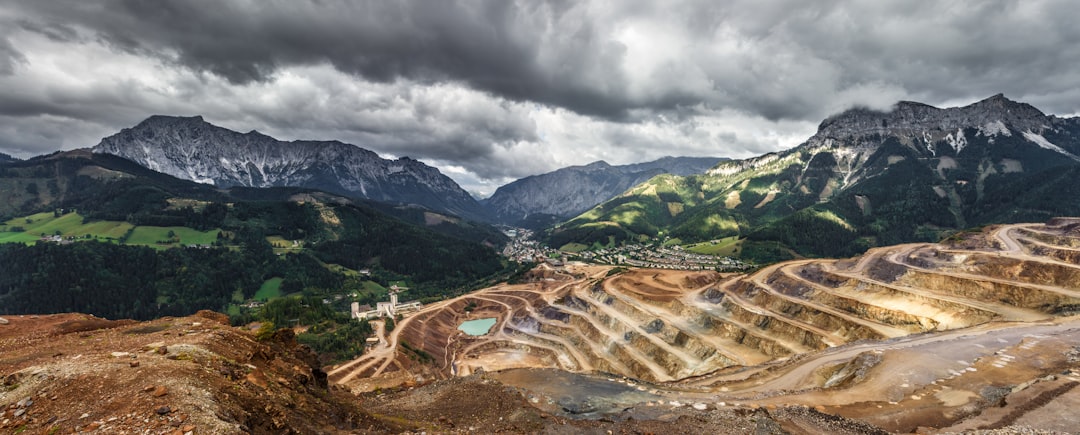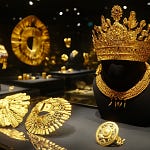There are just three ways, I once heard someone say, to create real wealth:
You make stuff
You mine stuff
You grow stuff
Everything else is just redistribution - pushing what is already there around.
We can argue about whether offering a service is “making stuff”. I would say, generally, it is.
I’ve always loved that as a maxim by which to view things. Pretty much all wealth creation comes under one of those three categories. You are bringing something new into the world that did not previously exist.
It’s why I have issues with forex. The foreign exchange markets are the largest and most liquid financial markets in the world. They are more than 25 times larger in daily turnover than all of the world's stock markets combined. Forex has made many people supremely rich. But is forex trading actually creating new wealth or is it another illusory consequence of fiat, and just pushing existing wealth around?
It’s a question for another time because it’s item two on that list - mining - that I want to talk about today, that loathed and despised industry, responsible for so much pollution, waste, injury, fraud and death.

Why mining is so important
We need mines. We cannot do without them. They are essential to human progress. Mines provide the raw materials that are the foundations for modern living. We would not have the world we have around us today were it not for mining: the primary means by which natural resources - metals, minerals and fossil fuels - are extracted from the earth. Human beings have been mining since before the Bronze Age and we won’t ever stop.
These natural resources can be used to make wonderful things: buildings, bridges, planes, trains and cars, electronics, and, of course, energy. Mining, and all the risks you have to take to do it, is to bring new and real wealth into the world that did not previously exist.
In the West we sit at our desks all day, in our clean, sanitised environments, and we forget that, for example, for the internet to exist, we need untold amounts of metal , be it steel, copper, silver or some rare earth metal neither you nor I know the name of.
With our cosseted western existence, we have in many ways lost touch with the world around us: the land, the environment, the animals and plants we eat. We have forgotten just how the things around us came to be. There was a time when you would build up a relationship with an animal before you ate it. I’m looking around me at my office and every single item - from my desk to my computer to my books to the house I’m in - would not exist without mining.
If Net Zero is to be realised (spoiler alert: it won’t be), and we are going to transition from fossil fuel to electricity, we are going to need to mine unprecedented amounts of copper and lithium (which in itself is going to entail extraordinary amounts of fossil fuel consumption).
But mining has a huge environmental impact. Though it’s hard to find a human activity that doesn’t have an environmental impact, mining is exceptional. Together with certain types of fishing, it’s probably the most environmentally damaging of all industries. That’s why there are so many rules and regulations in place. They’re there to attempt to minimise damage.
Mining will never have zero impact. There is a trade-off between the impact of the mine, the wealth it creates and the benefits it brings.
But it is because of the potential mining has to cause harm, to the environment, to local communities, to workers, that so many of us feel ambivalent about it, if not downright opposed.
The fellowship of mining
There are common characteristics to miners, visible throughout history and in all the myth and legend that surrounds them: brave, strong, hard working, fiercely proud, stoic, with incredible camaraderie amongst them - probably because of the incredible risks and effort involved in doing their job.
From Snow White to Middle Earth, you see it in the depiction of dwarves, the miners of mythology. Visit any of the old mining pubs in Cornwall, Wales or the North East, where the mines are no more, but look at the pictures on the wall, let your senses go and you can feel it there too. The old boys who used to work in the now closed mines still talk about the camaraderie.
Mining is hard. It always was and it always will be, even with modern machines. Never mind the financial and political risk, it’s dangerous. It’s a difficult business. You have to go to some of the most unsavoury parts of the planet.
Yet for decades we have been attacking mining. We attack this key industry, which instead we should support.
Protestors become heroes when they stand against this terrible industry. Lawmakers do not stand up to protestors, they bow to them.
The cost of regulation in the UK is so high, the mining industry barely here exists now. We have lots of coal, we have tin, we have copper, we even have tungsten and lithium, but producing mines are few and far between. We were once a nation once internationally famous for its mines and its miners. It’s why so many metals exchanges are here. It’s why so many international mining companies are based here.
We are using more metal than ever here in the UK, yet we are barely producing any of it. We are getting that metal from Asia, Africa, Australia and the Americas. Just because that mining is out of sight, it isn’t any less damaging to the environment.
Heaven forbid the war in Ukraine, or tensions between China and the West, or Islam and Christianity, could grew into some kind of global conflict. If it does, we have big strategic problems - because we barely produce any metal.
"The Battle of Production is the Battle of Life and Death,” said Winston Churchill to the House of Commons in September, 1940.
“It is being fought out every day in every mine, factory, and farm in the country. It is the Battle of the Coal Mines. It is the Battle of the Steel Mills. It is the Battle of the Harvest Field. It is the Battle of the Factories and Workshops. It is the Battle of the Shipping Lanes. It is the Battle of the Aircraft Factories. It is the Battle of the Munitions Works. And on the outcome of this Battle depends the life and death of the nation."
So it was with great concern that I read this article from Chris Hinde about mining graduates.
The state of mining in the UK
Cornwall’s Camborne School of Mines, founded in 1888, once used to be the most important mining college in the world. Through the 20th century, its graduates operated many of the world’s most significant mines - in Southern and Western Africa, Malaysia, Australia, South America, Mexico, the United States and Canada. It is now merged with Exeter University.
Do you know how many British people over the past two years have enrolled in mining engineering or mineral processing undergraduate courses there or indeed anywhere in the UK?
Take a guess.
The answer is not one. Not a single person.
As recently as 1990, there were over 300 mining graduates every year from five UK mining schools. Now there are none.
The UK’s Engineering Council has 1,237 registered mining and mineral processing engineers. 80% of them are over the age of 50. Half of that 80% are over the age of 66 - retired or about to be, in other words.
We used to export mining talent all over the world, but just to operate the few mines we have left here in the UK, never mind build new ones, the UK Mining Education Forum calculates the country needs over 60 new mining engineering and minerals processing graduates every year. We have none.
Everybody wants to work in finance or tech. With years of greenwashing, we have forgotten the essential contribution which mining makes to society. We have lost touch. The green narrative has done so much structural damage to our history, our identity and our industry.
Who is going to run Cornwall’s tin and tungsten mines, or extract its lithium? Who will operate Cumbria’s new coal mines (should they ever get planning approval)? If we don’t act fast, we will lose the self-knowledge of our own landscapes to be able to utilise their many and varied natural resources. This is not just a UK problem, by the way, it is the case across Western Europe.
One lesson of the soaring cost of energy is that the mineral resource industries need investment and support, not attacking. Why would you invest in future production, if you know the government is just going to impose windfall taxes?
The War in Ukraine, and especially the bind in which Germany finds itself, has demonstrated the strategic stupidity of being dependent on dodgy regimes for essential resources, when there is abundant domestic natural supply.
The ridiculous irony is that to import resources from unscrupulous corners of the earth is considerably less green than producing them ourselves.
A rather big country somewhere to the far east of us gets the concept of making stuff, mining stuff and growing stuff in a way that we no longer seem to. What are the implications?
If you’re buying gold, my current recommended bullion dealer in the UK is The Pure Gold Company, whether you are taking delivery or storing online. Premiums are low, quality of service is high. You can deal with a human being. I have an affiliation deals with them.
If you’re buying bitcoin, be sure to read my special report.
And make your Number One resolution for 2023 to listen to Kisses on a Postcard.
















Share this post